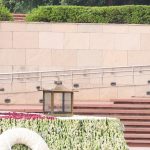Srinagar, May 24: For many Kashmiri pilgrims, the Haj pilgrimage is not just a journey of faith but the fulfillment of a lifelong dream—a sacred calling to the holy cities of Makkah and Madinah.
However, for several of them who have recently arrived for the annual Haj, this deeply spiritual journey has been marred by discomfort, frustration and unmet expectations.
Videos circulating on social media show a distressing scene: elderly pilgrims huddled in cramped hotel rooms, visibly uncomfortable due to power outages, non-functional lifts, and inadequate washroom facilities. In one such clip, an elderly woman is seen in utter discomfort due to some ailment while no immediate medical care was available as shown in the video. “We didn’t expect luxury,” she says tearfully, “but at least we hoped for basic dignity—clean toilets and a place near the Haram.”
Abdul Rashid Bhat, a 68-year-old pilgrim from Anantnag, told Rising Kashmir from Makah shareef, “We came here with hearts full of prayers, but the conditions are testing our patience. Our hotel is far from Kabah Shareef. It takes us over half an hour to reach, and there’s no shuttle. Some of us are too old to walk that much daily.”
Another pilgrim, Fatima Jan from Baramulla, said: “The washroom is shared by more than 10 people. We have to wait long, even for wazu”
When contacted, Dr. Shujaat Qureshi, Executive Officer of the J&K Haj Committee, acknowledged the complaints but urged for a balanced view. “The viral video shows only part of the picture. According to Saudi regulations/guidelines, accommodations are to have one washroom for every ten pilgrims. The hotel shown does meet that standard,” he said. “In the video, the electricity indicator is on, and the lifts are operational—pilgrims are waiting, not stranded. The rooms and washrooms appear to be in fair condition.”
However, Dr. Qureshi conceded that the location of some hotels is a legitimate concern. “The only genuine issue seems to be the distance from the Haram,” he admitted. “We have taken up this matter with the Haj Committee of India, which will raise it with the Saudi authorities. If the distance exceeds the permissible range, pilgrims are entitled to a refund as per the guidelines.”
Despite the hardships, many Kashmiri pilgrims remain resilient, drawing strength from their faith. “It is tough, yes,” said Bilal Ahmad Dar, a first-time Haji from Budgam. “But I keep telling myself—this too is part of the test. We are here for Allah’s sake. May he accept our prayers and forgive our shortcomings.”
The Haj Committee has assured pilgrims that efforts are being made to rectify the genuine issues and ensure that the remainder of the journey is as smooth and spiritually uplifting as possible.
As thousands of Kashmiri pilgrims bow their heads in prayer before the Kaaba and Masjid-e-Nabawi, they carry not only the hopes of their families back home but also a silent wish for better care and dignity along this sacred path.











I am performing Haj this year through J&K Haj Committee. The narrative in the video is far from reality. Accommodation, transportaion and other logistic arrangements are excellent. It is true that we are accommodated in Azizya and we have to change 2 buses to reach Harami pak. But transportaion facilities are very good and it does not take more than 30 minutes to reach Kabba Sharief. Medical facilities are very close to our building and we did not find any issuecqith the availability of doctors, medicines or diagnostic facilities whenever we need them. Once wec have set out for Haj, we should not expect 5 star facilities.